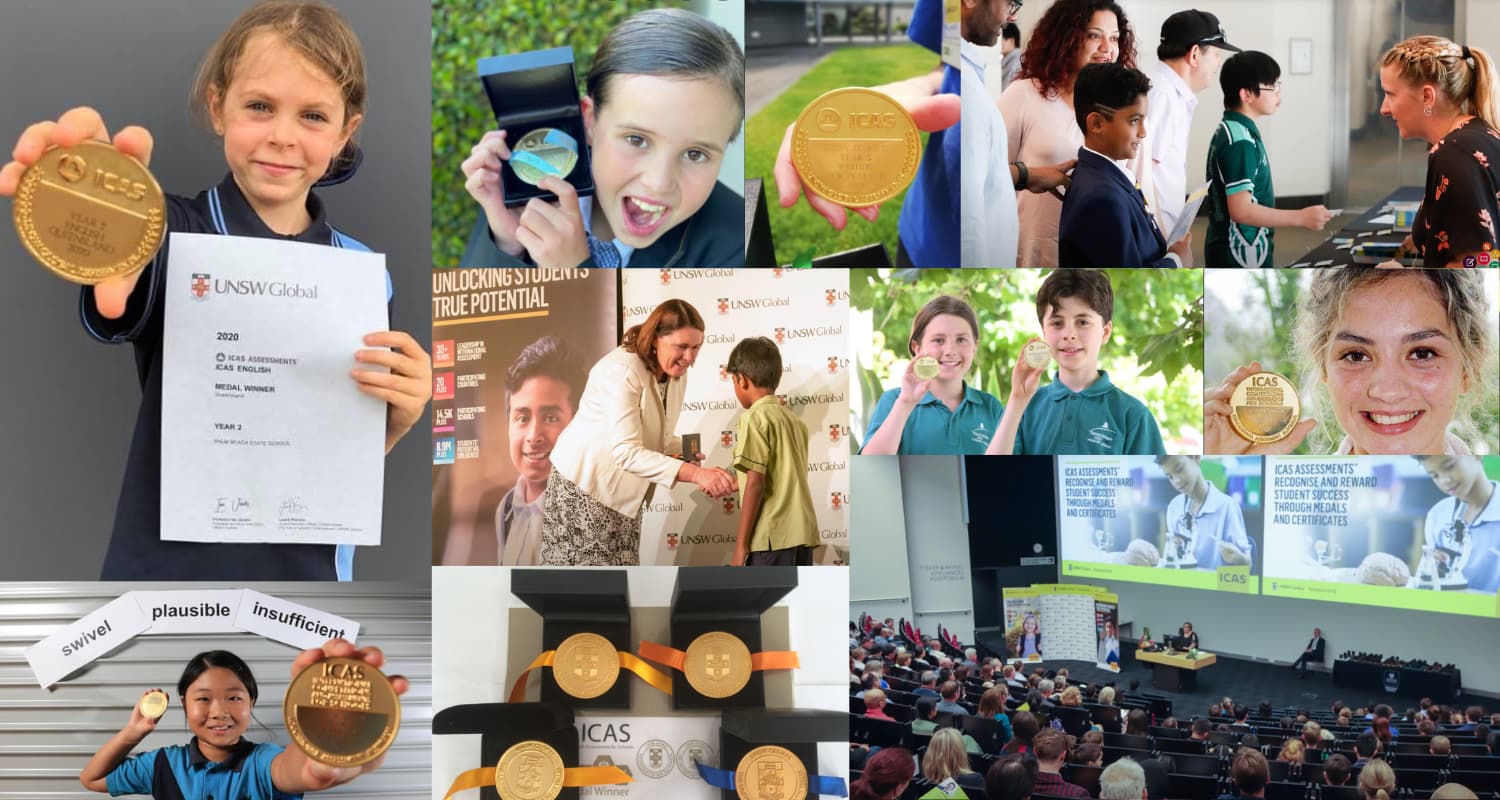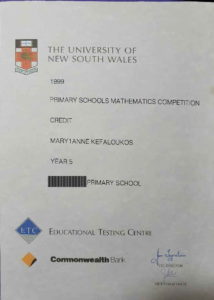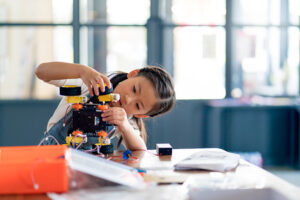40 years of ICAS – through the eyes of our team

ICAS turns 40 this year – and it’s fair to say that it has evolved and matured with plenty of character, complexity and spirit. Here, some of our key and longer-term team members reflect on the aspects of the competition that they’ve found most meaningful and memorable over the years.
“I’m always in awe of the talent of these kids. They do the tests in a fairly short period of time and to be able to score a full mark is incredible.”
Kerry Tremaine was a geography teacher when she first joined the team in 1999 as a part-time writing marker. She then embraced a job full-time role on the development team and worked on almost every one of the ICAS subjects before rising to Head of Test Development.
“The competition was already huge and very well known, and was the only academic competition that existed in schools. It had a reputation of being very challenging. A high mark in an ICAS test was used as one of the indicators of gifted students.
“My sons were very young then, and their names appear in tests I’ve written over the years. So if you notice any question that has the name ‘Liam’ or ‘Nick’ in it, it’s probably a question I wrote!
“I’ve always encouraged my team to go out to schools and sit and watch the kids do the test; you learn so much from seeing how they react to how we’ve shaped the questions. I see the difference it makes to my team. It suddenly reconnects you with how kids learn and how vulnerable they are – what we’re doing is affecting them and that’s something that we take very seriously.
“I’m always in awe of the talents of these kids. They do these tests in a fairly short period of time and to be able to score a full mark is incredible. Seeing them get up on stage at the medal ceremony and have that glow – some of them have never been on stage for anything before. They’ve never won a sports carnival, nor been in a school play. It’s very touching to hear what the experience means to them, such as ‘I’m really good at ICAS Science, so I’m going to be a scientist’.
“This competition shines a light on them and the talents that others may never have realised they had. Their teachers don’t always notice, their parents don’t always notice, but they notice after they’ve done ICAS.”

Mary-Anne Kefaloukos, ICAS Assessments Customer Experience Manager, and a passionate former specialist primary Science teacher, says:
“I keep my ICAS certificates because they remind me that I had a go at something challenging, which, inch by inch over my childhood years, stood me in good stead for accepting bigger challenges as an adult.
“This is my Maths ICAS Credit certificate. I was in Year 5 and the kids used to get excited about ICAS because it was a ‘special’ test. I had average class grades in maths and when the teacher read out my name for a Credit, my classmates gasped because we all knew how hard the test was and no one in our class won a higher score that year. I got a little more street cred among my peers after that.
“I still have my Science participation certificate. Not as prestigious as a grade, but I went on to become a science teacher anyway!”
“One year our test asked students to write a book review, and a girl wrote a review of a dictionary. It was sheer imagination.”
Janelle Ho was an English teacher in Singapore who had taught for a decade before she moved to Australia to join the ICAS literacy team in 2003. She worked on test development for the Writing and Spelling tests, as well as manual marking and training markers. She is now Test Development Manager – Literacy.
“I felt very privileged to join the team. I was a new immigrant and I was lucky that the hiring managers knew a lot about education in Singapore and gave me a shot.
“We’re lucky in the literacy team because for all the other subjects it’s simply a number out of the multiple-choice questions, but with Writing, we actually get to see the students’ writing, and that’s a special buzz.
“Out of all the medal-winning scripts I’ve read over the years the one that stands out most is where a test asked the students to write a book review, and a girl from Tasmania wrote a review of a dictionary. I mean – how do you review a dictionary? It was such an amazing text, we pinned it up in the marking centre. The marking staff just said, ‘Oh my goodness’. It was very well-crafted and just the sheer imagination, it was amazing.
“On the team, we have a strong sense of collegiality and of working towards a common goal. We strive very hard to help each other. I’ve seen ICAS go through a lot of changes, but that spirit has stayed the same. It’s one of the reasons I’ve stuck around for 18 years!
“It’s very much about helping students reach their potential. When we’re constructing a test we want them to be able to show their best but also to learn something from the experience – to come out of it a little bit better than when they went in. That’s very important to me.”
“I remember combing through the warehouse waste bin to find a missing paper – fond memories!”
Jennifer Cowing has spent her entire 19-year working life with ICAS Assessments, starting in the warehouse as a teenager. Temp roles taught her the logistics of the competition from the inside out – including customer service, administration and events – before she moved on to eventually lead the operational functions as Head of Customer Experience & Operations.
“Back when I was in the warehouse in 2002 the ICAS operation was very different. All orders were on paper, delivered by post and paid for with a cheque. We manually picked and packed all test materials, instructions and return envelopes. Our team had a causal crew of 30, working day and night shifts.
“We’d receive answer sheets, which we’d sort, count and scan by hand, and convert to printed reports. It was deeply ingrained that we should never, ever let a single student’s answer sheet get lost. If the count was ever out, I remember combing through the waste bin until we found the missing paper – fond memories!”
“As a behind-the-scenes person, the ICAS moment that’s touched me most over the years was the 2020 ICAS virtual ceremony and the photos, videos and stories shared by the students. After all the challenges of COVID-19, to hear the joy they felt to find out they won and to receive the medal was extra special. I’m usually on the ground organising the in-person event, so I don’t usually get to hear this side of it. The students’ stories are just beautiful and you can’t help but have the biggest smile for them.”
At 20+ years into her tenure, Reporting Manager Sasi Chitrapu is one of ICAS’s longest-serving members. She says:
“The educational analysis behind ICAS is fascinating. Over the years I’ve gotten to work with several very brilliant people and saw the competition go international, which was a big moment.
“As different teams we unite our minds and skills and work together to deliver ICAS each year, which is very rewarding.
“Education is a very important part of my life and for everyone on the team for us. It’s amazing to know that our contribution is helping students achieve and be their best.”
“The people who thrive on the ICAS team are usually a bit odd – they think sideways; they look creatively at what appears to be routine.”
British-born Nick Connolly has been on the ICAS team for a total of 15 years. He arrived in Australia with his young family in 2002 with plans to get a job as a teacher, when he saw “a weird job at the university [UNSW]” and found himself writing puzzling math tests for ICAS. He is now Head of Analysis and Reporting.
“We were growing and redesigning the Maths competition, which was exciting – making it more about problem-solving and really stretching it.
“Collaborating with educators here and overseas has been a highlight for me, seeing them realise you can do creative things with subjects that people don’t think of as being particularly creative. That’s something we really value, like: ‘Isn’t this weird, wonderful maths!’
“I’d say everyone on our team is a little bit sideways. The people who thrive here are usually a bit odd – they think sideways; they look creatively at what appear to be routine tasks. If you’re not enjoying the questions you’re writing, you can’t expect kids to enjoy them. You should be getting a bit of a kick out of it.
“Behind the scenes, people wouldn’t realise how long it takes, it’s a 15-month process to create and check an ICAS test. I think for many people it can be a bit of a surprise: ‘Oh yeah, somebody must do that. That must be somebody’s job.’
“I do get teary at the medal ceremonies – these bright and able kids have done amazing things and are so proud of themselves. We’ve gone to all that effort to write these cunning questions and they saw through it, they’ve outfoxed us! That always touches me.
“ICAS is not meant to be scary or stress-making, it’s not an exam. It’s a very friendly, supportive way of doing something competitive. If you do well, that’s really great. And if you didn’t, well, it’s a very hard test so well done for trying. I really love the ethos of it.”
Did your school or child take part in ICAS in 2021? Are you inspired to get involved in 2022?
Sales are open for this year’s ICAS across all subjects. Sign up to the competition here >



